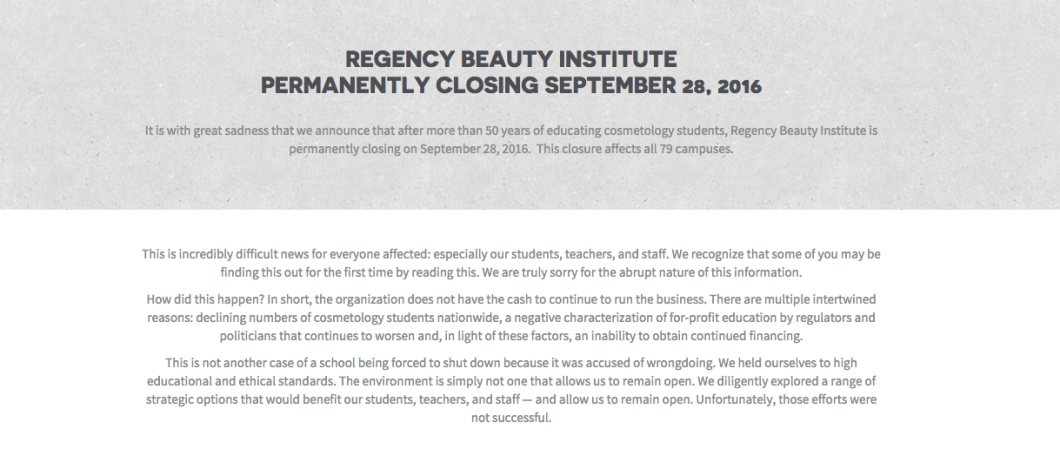Senators Urge Continued Oversight Of For-Profit Colleges Amid Another Closure Image courtesy of ken fager
For-profit college operators continued to take hits this week, as lawmakers called for federal aid restriction on the Computer Systems Institute brand, and smaller Regency Beauty Institute brand announced it would close.
Less than a month after one of the industry’s largest companies ITT Educational Services closed its doors, following the Department of Education decision to ban the operator of the ITT Technical chain from accepting federal student aid, several lawmakers sent a letter [PDF] urging the Department of Veterans Affairs to do the same with Computer Systems Institute.
Senators Dick Durbin (IL), Richard Blumenthal (CT), Sherrod Brown (OH), and Tom Carper (DE) urged the VA secretary Robert McDonald to immediately withdraw Computer Systems Institute (CSI) from participation in the GI Bill program after an investigation found evidence the schools allegedly defrauded students.
According to the letter, the Dept. of Education terminated CSI’s participation in federal student loan programs in January amid findings the college submitted false job placement data to its accreditor and disclosed false job placement data to current and prospective students.
The senators questioned why the VA has taken so long to take action against the school despite a law that requires the disapproval of any institution that engages in misleading practices.
“The Secretary shall not approve the enrollment of an eligible Veteran or eligible person in any course offered by an institution which utilizes advertising, sales, or enrollment practices of any type which are erroneous, deceptive, or misleading either by actual statement, omission, or intimation,” the law states.
In other for-profit college news this week, Minnesota-based Regency Beauty Institute announced it would close the doors of its 79 campuses across the country.
The college, which had about 7,000 students enrolled at the time of the closure, claimed the decision to cease operations was a result of several issues including “a negative characterization of for-profit education by regulators and politicians that continues to worsen.”
Regency made a point of noting that the closure was not the result of federal sanctions.
“This is not another case of a school being forced to shut down because it was accused of wrongdoing,” the company said on its website. “We held ourselves to high educational and ethical standards. The environment is simply not one that allows us to remain open. We diligently explored a range of strategic options that would benefit our students, teachers, and staff — and allow us to remain open. Unfortunately, those efforts were not successful.”
Regency’s demise adds yet another group of thousands of students to those that will likely seek closed school discharges for any federal loans they took out to attend college, Sen. Durbin (IL) said in a statement.
Tens of thousands of ITT Tech students are currently working to have their debts erased following that chains closure.
Despite this option, Durbin urged consumers looking at for-profit colleges to think twice, noting that closures such as those of Regency and ITT put a burden on taxpayers.
“We gave Regency $50 million in taxpayer dollars last year through federal grants and student loans,” Durbin said, while calling on educators to warn students of the dangers of enrolling in for-profit schools. “The Regency Institute operators took the millions, pulled the plug, and left the students and taxpayers high and dry.”
Want more consumer news? Visit our parent organization, Consumer Reports, for the latest on scams, recalls, and other consumer issues.


